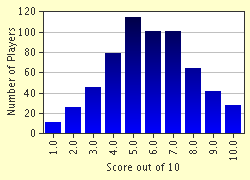Quiz Answer Key and Fun Facts
1. There is a phrase that refers to someone who will 'out-herod Herod'. This is a reference to the ancient ruler who was known for what trait?
2. It is often said that one 'crosses the Rubicon' when one makes a key decision and acts on it. Which Roman literally crossed the Rubicon and thereby gave rise to the phrase?
3. Another word for traitor is 'quisling'. In what war did Quisling collaborate with the enemy?
4. Certain literary works are today described as 'bowdlerized', due to the influence of Thomas Bowdler. What does the term imply?
5. It's common today to speak of a defeat as 'meeting one's Waterloo'. Who was the principal architect of the victory there against Napoleon?
6. The term 'gerrymander' originates with the practices of Elbridge Gerry. Under which President did he serve as Vice-President?
7. The phrase 'pyrrhic victory' is used to describe a victory that is incredibly costly. It originates with King Pyrrhus - who fought just such a battle against what enemy?
8. The term 'billingsgate' originates with the coarse language that was commonplace at a particular fish market area. Where was it located?
9. The word 'stentorian' means {loud;} it originates with a figure named Stentor. In what war did he fight?
10. The term 'hector' today refers to a bully or braggart. Who killed Hector in the Trojan War?
Source: Author
robert362
This quiz was reviewed by FunTrivia editor
LadyCaitriona before going online.
Any errors found in FunTrivia content are routinely corrected through our feedback system.
